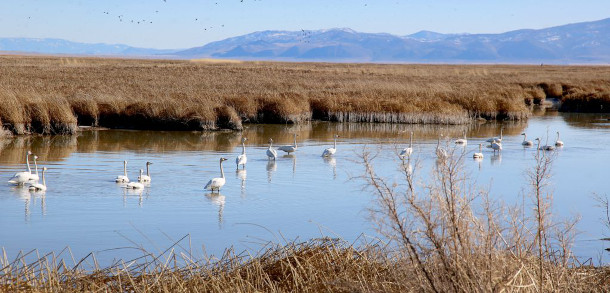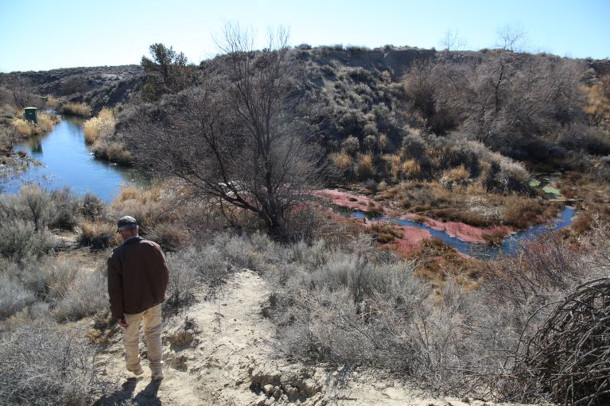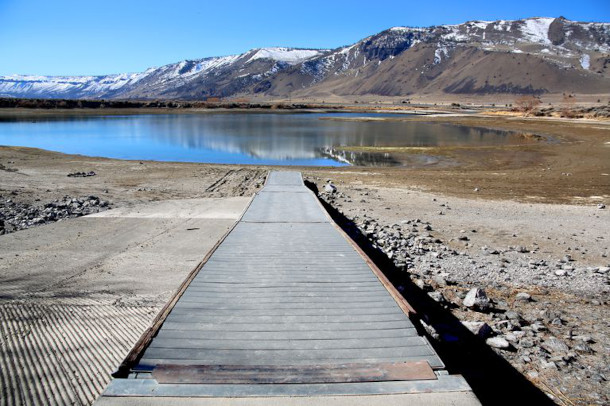Draining Summer Lake
Air Date: Week of April 8, 2022

A flock of birds stand in the waters of Summer Lake. (Photo: Emily Cureton Cook, OPB)
Oregon's Summer Lake Wildlife Area has protections in place for the land, but not for the water. Under the current water rights, the springs that feed this critical migratory bird habitat could dry up within a generation. Emily Cureton Cook reports on Summer Lake for Oregon Public Broadcasting.
Transcript
CURWOOD: It’s Living on Earth, I’m Steve Curwood.
DOERING: And I’m Jenni Doering
Summer Lake in the high desert of southern Oregon is a critical stop for migratory birds but the springs that feed the lake are at risk of drying up. Oregon Public Broadcasting reporter Emily Cureton Cook has the story.
CURETON COOK: Cool, clean water bubbles up from the ground where Ana Springs begin. This groundwater is the lifeblood of Summer Lake State Wildlife Area. It hosts millions of migratory birds every year.
ST LOUIS: We're right here in the Pacific Flyway. These are the main pathways that birds move north and south across North America.
CURETON COOK: Biologist Marty St. Louis was a state wildlife manager here for over 30 years. He's retired now, but he still lives next door, and he delights in watching the neighbors.
ST LOUIS: Those are tundra swans.
CURETON COOK: Tundra swans.
ST LOUIS: They used to be called whistling swans. These are Coots, American Coots. So this is where the rails live. We have just a handful that spend the wintertime here. Now, here's a pair of sandhill cranes.
[SOUNDS OF BIRDS HONKING]
ST LOUIS: They're just letting you know. And do you see this white out here? Snow geese -- 10 to 15,000 of them.
CURETON COOK: Without groundwater springs, all this would go silent. The lake depends on springs and their extinction is a real threat, says Lisa Brown, and environmental advocate and attorney for the nonprofit WaterWatch.
BROWN: It's alarming that we have a plan in place in Oregon to basically dry up Summer Lake.
CURETON COOK: Brown says the Oregon Water Resources Department has stood by while agricultural wells overdraw the aquifer and drain the springs. The state agency's own data show Ana Springs have been declining steadily ever since people started pumping groundwater to nearby hay farms.
BROWN: That got my attention.

Retired state wildlife manager, Marty St. Louis, walks through prickly desert plants to reach the banks of the Ana river. (Photo: Emily Cureton Cook, OPB)
CURETON COOK: Water Resources Department Deputy Director Doug Woodcock acknowledges that wells in the region are lowering the water table, which very likely contributes to the springs drying. But he denied any intentional plan to favor farmers.
WOODCOCK: That's just the nature of groundwater hydrology.
CURETON COOK: Under already-approved state water rights, farmers motivated by rising hay prices could extract a lot more well water in the future.
WOODCOCK: People grow into their water rights over time. They don't just start immediately using the maximum amount.
CURETON COOK: In the 1980's farms were taking less water. Back then a state scientist predicted that completely draining the main source of Summer Lake would take decades, or it might take a century. More than 30 years later, more water goes to farms. The springs are shrinking, and the state agency that could step in hasn't. It's now focused on parts of Oregon with aquifers that are even more severely overdrawn.
WOODCOCK: The department does have a charge to manage the area sustainably. And as we can get to it, we will.
CURETON COOK: Future regulations will likely pit people who value water for wildlife against those whose communities depend on farming. Dan Jansen is a hay grower who wants to conserve more water and avoid a crackdown on water rights.
JANSEN: If we get cut back here it's going to be devastating. I mean, this will be a ghost town. Nothing but blowing sand here.
CURETON COOK: High winds and harsh weather famously batter his home in Christmas Valley, where few crops will grow. Jansen says these extreme conditions are part of what makes alfalfa hay actually thrive there.

Shrinking water levels at a reservoir over Ana Springs, as groundwater is released to a river channel that feeds Summer Lake State Wildlife Area. (Photo: Emily Cureton Cook, OPB)
JANSEN: This is the best climate, probably in the world, for this crop.
CURETON COOK: He says buyers from Asian countries like China, Japan and South Korea will pay a premium price for Christmas Valley hay.
JANSEN: And now we're starting to get a lot of Middle East countries that are buying because they don't have any water to grow it.
CURETON COOK: Jansen is planning for a future where declining groundwater is going to affect his livelihood. That reality is already starting to show in the wildlife area, says retired manager Marty St. Louis.
ST LOUIS: Right now, it's like a death by a thousand cuts.
CURETON COOK: He worries that wetlands like Summer Lake are disappearing all over the world.
ST LOUIS: We're thinking on, you know, human terms of 50, 100 years. But Mother Nature, I mean, she's thinking on thousands of year intervals.
CURETON COOK: And when compared to a lake that's 10,000 years old, the decades until Ana Springs dry up are only a fleeting moment. I'm Emily Cureton Cook, reporting.
DOERING: Emily’s story comes to us courtesy of Oregon Public Broadcasting.
Links
Living on Earth wants to hear from you!
Living on Earth
62 Calef Highway, Suite 212
Lee, NH 03861
Telephone: 617-287-4121
E-mail: comments@loe.org
Newsletter [Click here]
Donate to Living on Earth!
Living on Earth is an independent media program and relies entirely on contributions from listeners and institutions supporting public service. Please donate now to preserve an independent environmental voice.
NewsletterLiving on Earth offers a weekly delivery of the show's rundown to your mailbox. Sign up for our newsletter today!
 Sailors For The Sea: Be the change you want to sea.
Sailors For The Sea: Be the change you want to sea.
 The Grantham Foundation for the Protection of the Environment: Committed to protecting and improving the health of the global environment.
The Grantham Foundation for the Protection of the Environment: Committed to protecting and improving the health of the global environment.
 Contribute to Living on Earth and receive, as our gift to you, an archival print of one of Mark Seth Lender's extraordinary wildlife photographs. Follow the link to see Mark's current collection of photographs.
Contribute to Living on Earth and receive, as our gift to you, an archival print of one of Mark Seth Lender's extraordinary wildlife photographs. Follow the link to see Mark's current collection of photographs.
 Buy a signed copy of Mark Seth Lender's book Smeagull the Seagull & support Living on Earth
Buy a signed copy of Mark Seth Lender's book Smeagull the Seagull & support Living on Earth

